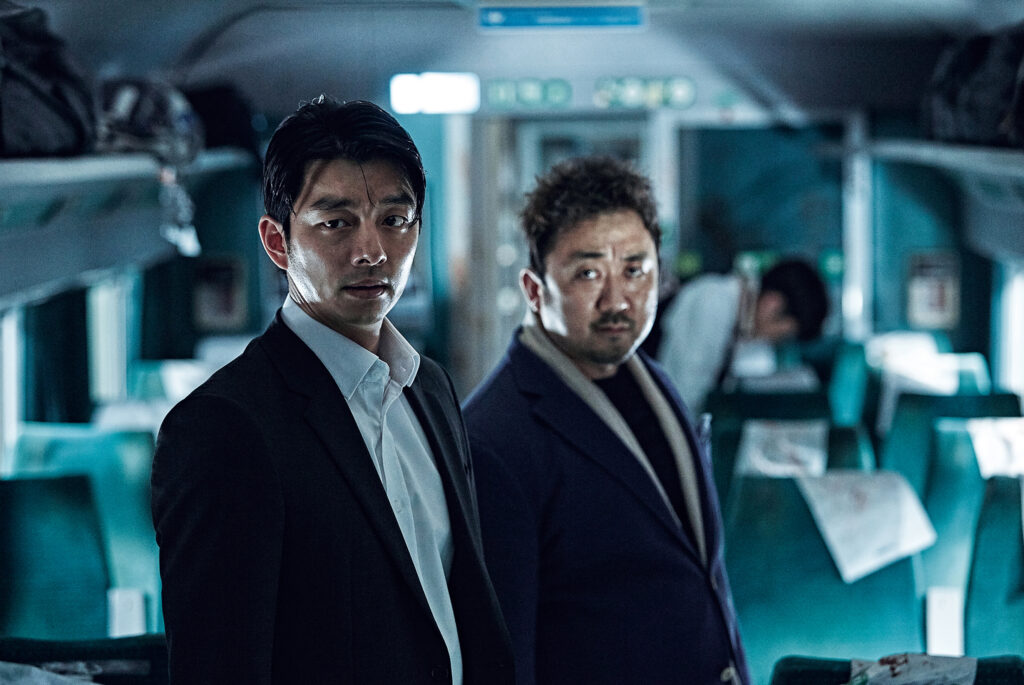
For several years, in the golden age of streaming, Train to Busan found a home on Netflix US. The film was always a phenomenal successful both at home and abroad. And almost a decade later, Hallyu (the Korean Wave) has reached new heights, and with that, Train to Busan, the 2016 zombie film about fatherhood, has earned a special seat among the wave’s other heavyweights: BTS, Squid Game, Black Pink, “Gangnam Style,” Sky Castle, Naver’s Webtoon site, Parasite. The accessibility provided by streaming services like Netflix was no small part of the rise in position.
The talented and always delightful to look at Gong Yoo plays the selfish workaholic hedge fund manager Seok-woo. He’s a shitty father to Su-an (Kim Su-an), who, in sad irony, asks her dad for the birthday present of taking her to her mother in Busan. In retrospect, the role stands out in the actor’s filmography for his initial coldness and despicability. (It’s no Coffee Prince, that’s for sure!) The only train that will satisfy Su-an leaves in the sad space between night and morning. Just as the KTX embarks from Seoul, in an information (and trope) rich shot, an injured and panicked passenger slips on unnoticed. The simple shot communicates so much with so little; it’s also the movie’s first moment of horror since the VFX masterpiece prelude featuring a zombie deer. The observer view’s of the injured passenger fiasco creates a sense of providential urgency for Seok-woo, whose own distanced parenting leads to the worst day of his life: his daughter’s birthday. Now he must learn how to be a dad during a zombie apocalypse before his last opportunity passes.
Director Yeon Sang-ho’s film calls for an imaginatively rich emotional insight into fatherhood, even if it comes with some of the baggage of patriarchy. In one of the first moments of emotional vulnerability between Seok-woo and Sang-hwa (Ma Dong-seok), another passenger on the train and husband to a pregnant wife, the latter vocalizes the sacrifice of fatherhood by telling him, whether or not he actually believes it, that one-day Su-an will understand why he was always working. Many of the film’s great images capture the tenderness of parental love: a close-up of a father’s hand holding his daughter’s, a husband glancing back at his wife and in his dying breaths suggesting a name to his pregnant wife for their coming child, an infected father running from his child in one last act of sacrifice. The sacrifice of fathers — and husbands — factors greatly into the last stand of passengers on the train to Busan. Children, pregnant women, and the elderly take precedence in the survival plans; men, especially those with women to protect, rise to the moment and become heroes. Fatherhood here may require an investment of tenderness and emotional volatility, but it’s also shaped by masculine colored values. Like peanut butter on a knife, patriarchy sticks uncomfortably close to the characters in Train to Busan. Not once does a female character ever take a social position less vulnerable or precious than any of the film’s many men, protagonist and antagonist alike.
Yeon’s film was instrumental in securing Ma Dong-seok’s grip on North American lovers of Korean cinema. The film came more than a decade into his professional acting career and was by no means an “introduction” or anything back home. For many American film watchers, though, watching his Sang-hwa bare-fist slug zombies into squishy pulps on a moving train was a revelation of action. Every blow from his arms arrives with tremendous force. He makes average directors of action look like the genre’s longest and most artistically observant connoisseurs. The truth of the matter is he’s just incapable of not making a punch look like a real heavyweight haymaker.
The origins of the zombie outbreak, unlike many of the more recent American entries in the genre, never occupy too much of a concern. At least not in traditional plot priorities. Only once does the rabid virus’s origin ever come up explicitly and it indicts big capital in the process. The moment, which I will refrain from mentioning here for spoiler purposes, is followed by a silent Shakespearean handwashing from one of the film’s many capitalist figureheads. Unlike George Romero’s films, capitalism doesn’t make a marriage to the zombie film through consumerism but through the actual survival of the transit riders. Those who turn survival into give-and-take mercantile transactions stand no chance; only those who view each other’s lives with vulnerability and potential, and their own with sacrificial love and completeness, stand a chance.
Train to Busan
2016
dir. Yeon Sang-ho
118 min.
Screens at the Coolidge Corner Theatre on Saturday, 4/20 at midnight!
Part of the month-long series: No More Room in Hell: The Legacy and Films of George A. Romero
Joshua Polanski is a freelance film and culture writer who writes regularly for the Boston Hassle and In Review Online. He has contributed to the Bay Area Reporter, Off Screen, and DMovies amongst other places. His interests include the technical elements of filmmaking & exhibition, slow & digital cinemas, cinematic sexuality, as well as Eastern and Northern European, East Asian, & Middle Eastern film.

